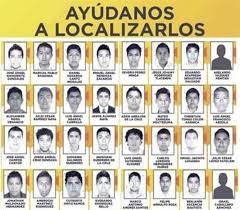Outrage at Disappearance of Mexican Students

November 21, 2014
While 43 students have gone missing in Mexico, millions fight for their return. Protests have broken out all over the nation in a response to the violent attack on a protest in the city of Iguala. Six died in the attack, and 43 have not been heard of since. The president’s inaction towards this disappearance has angered millions across Mexico, and has led to a nationwide sense of angry distrust towards the Mexican government and its possible passivity regarding drug cartels.
The students were protesting against the government’s recent tendency to place urban schools above rural ones and hire only inner city workers, when the Iguala mayor Jose Luis Abarca’s wife reportedly ordered the police to fire into the crowd, leaving six dead and 43 nowhere to be found. The state violence expressed here has led to the growing sense of distrust across the nation.
Numerous rumors and gang member confessions are spreading around the nation that the Iguala police transferred the students to gangs to be executed and burned to halt identification. However, this rumors remain unreliable as the DNA on the 28 bodies did not match with those of the student’s families. President Enrique Pena Nieta claims to catch the perpetrators, but his own history of organized crime ties leads the Mexican public to believe otherwise.
Today, anger rises in Mexico. Some protests remain peaceful, like estimated 50,000 citizens that gathered in Mexico City on Sunday and the nationwide university strikes and mass graves. However, many people are more willing to use violence, such as the protestors who torched capital buildings in the cities of Chilpancingo and Iguala.
An immense protest is set to take place November 20th in Mexico City, New York City, and Los Angeles. People all over the globe demand the return of the kidnapped students, as many said in a recent Union Square, protest “Alive they were taken. Alive we want them back”. As the public continues to speak out against the Mexican government, the near future will decide who is louder: the oppressed or the oppressor.

































